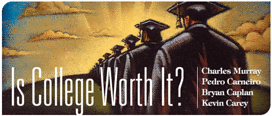Charles, in your book you identify 1180 as the combined SAT score cutoff for college readiness, based on the study you cite. U.S. News & World Report reports the 25th and 75th percentile combined SAT scores for colleges and universities in its annual rankings. Here’s a list of colleges and universities ranked as “Tier One” institutions by U.S. News that reported a 25th percentile SAT score equal to or lower than 1180:
University of California-Los Angeles
University of California-San Diego
University of Washington
University of California-Davis
University of California-Irvine
University of California-Santa Barbara
Penn State University
University of Texas-Austin
University of Florida
Yeshiva University
Smith College
United States Naval Academy
United States Military Academy
Lafayette College
Furman University
University of the South
Union College
Skidmore College
DePauw University
Pitzer College
Rhodes College
And of course there are a number of other top-ranked colleges with 25th percentile scores fairly close to 1180, which means that some significant percentage of students, perhaps as many as one in five, are enrolling despite scores that you think disqualify them from pursuing a legitimate college degree. And yet, they’re getting degrees. We know this because the graduation rate at nearly every one of the institutions listed above is greater than 75%, and the population of non-graduates surely includes both students who transferred elsewhere to graduate and students with SATs above 1180.
The point being, every year many students enroll in highly regarded colleges and succeed there despite not meeting your alleged minimum cognitive cutoff. And this doesn’t even take into account all of the very solid institutions in the lower tiers and the sub-1180 students who succeed there as well. Unless I’m misreading your proposal, you essentially want to radically shrink the population of traditional college-goers as a means of saving people who aren’t college material the trouble of attending. I submit that there is no sorting process even close to accurate enough to pull that off without denying college to large numbers of students who are perfectly capable of earning a bachelor’s degree. I’ll repeat my example of Eureka College (where only one-fourth of students enroll with the ACT equivalent of an 1180) and the 40th President of the United States. Often, people don’t find out if college is for them until they get there.

